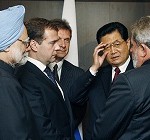Consider a situation when the richest families in your city, unable to meet the expenses of their high standard of living, and unable to agree among themselves on a future direction, ask you, a lower middle-class citizen, for a loan. The amount required is not fixed, the guarantee of return not certain, but the virtue of saving your city is visibly high even though you are having trouble making your own ends meet, because the situation was created by the rich in the first place.
This is exactly what the idea of the BRICS bailing out the Euro sounds like. After living beyond their means for years, the Europeans have had a rude awakening of their highly leveraged balance sheets. Greece alone requires $17 billion in its next installment of the $150 billion promised in May 2010 to stay afloat. If Italy, which has twice as much as debt as Greece, were to follow, the amount required for bailing it out remains anyone’s guess.
Among the BRICS, China is the only country with enough capital to even consider a bail-out. With $3.2 trillion in reserves, China dwarfs the other four whose reserves add up to little over $1.2 trillion – Russia ($533 billion), India ($319 billion), Brazil ($353 billion) and South Africa ($50 billion). If the external debt positions are factored in, $300 billion for Brazil, $305 billion for India, it doesn’t leave much for investment.
How then, is the idea of a BRICS-led bail-out of a € 750 billion ($1 Trillion) Euro-zone crisis even conceivable? Perhaps, there are macro-economic reasons. Brazil’s foreign exchange reserves are mostly a result of their Central Bank’s purchase of dollars being poured in by foreign investors. It may not want its source of capital to dry up. The Chinese reserves are fueled by similar intervention by their Central Bank to maintain their currency, and of course, their exports. Given that Europe is China’s largest trading partner at close to $400 billion, they have a vested interest in saving their client base. India’s foreign investment inflows have dropped from $70 billion in 2010 to $60 billion this year. It would not want the crisis to spread and affect revenues of its export oriented industries, such as IT, which gets close to 30% revenues from Europe. Finally, the volatility in oil prices has affected Russia for whom oil remains its primary export and forex earner. Thus, Russian participation, if any, would be driven more by the oil marketplace than by its proximity or historical affinity to Europe.
If the macro interests and capabilities are so disparate, does BRICS as a group, even have a role to play? If Euro-zone, which is a monetary grouping, has had difficulty in coordinating a fiscal response, how is BRICS, which is still an emerging alliance, expected to coordinate a bail out? They don’t have a coordinated strategy for managing their sovereign wealth funds (SWF). Brazil, China and Russia have one, whereas South Africa and India do not. Neither has there been any hint of the countries agreeing on converting additional portions of their reserves into Euros.
One way to add to the loan pool immediately would be to contribute to the IMF’s New Arrangements to Borrow (NAB) program. Brazil was a beneficiary of this in 1998. A second way would be to buy Euro bonds issued by the European Financial Stability Facility (EFSF) backed by the member states.
Regardless of the instruments available, since the financial strength is missing, this decision is increasingly looking symbolic. But even symbolic decisions need political will and tangible benefits in return. Brazil can use the opportunity to further its claim for a UN Security Council seat even though this investment seems tangential to the new President Dilma Rousseff’s socialist agenda. The Russians have been burnt by two crises, in 1998 and 2008, resulting in devalued currency and diminishing reserves. They may be reluctant saviors. India, burdened by its own socio-economic woes, cannot afford symbolic moves. The $17 billion installment for Greece alone is equal to the total budget of our National Food Security Bill for one year.
Perhaps, it is time to let businesses instead of countries participate in the bail-out. According to a report in The Guardian, Debt-ridden Greece gets vote of confidence from China, Chinese companies such as COSCO have already signed $1 billion deal to manage the Pireaus dockyard and are considering buying a stake in the railway network OSE. This confirms predictions that China is peeling itself off of BRICS in making investment decisions. Hence, Greece and Italy are courting China. This kind of strategy is something other BRICS nations should consider.
Whether the decision is financial, political or symbolic, BRICS must at least consider whether it is worth bailing-out Greece. During the Asian Financial Crisis, the IMF forced Asian economies to stop saving the currency and the banks, and introduce structural adjustments in return for IMF loans. Many institutions went bankrupt and individuals lost their wealth in the process. Why should it be any different now?
Akshay Mathur is Director, Research and Analysis & Fellow, Geoeconomics Studies, Gateway House.
This article was exclusively written for Gateway House: Indian Council on Global Relations. You can read more exclusive content here.
For interview requests with the author, or for permission to republish, please contact outreach@gatewayhouse.in.
© Copyright 2011 Gateway House: Indian Council on Global Relations. All rights reserved. Any unauthorized copying or reproduction is strictly prohibited.


